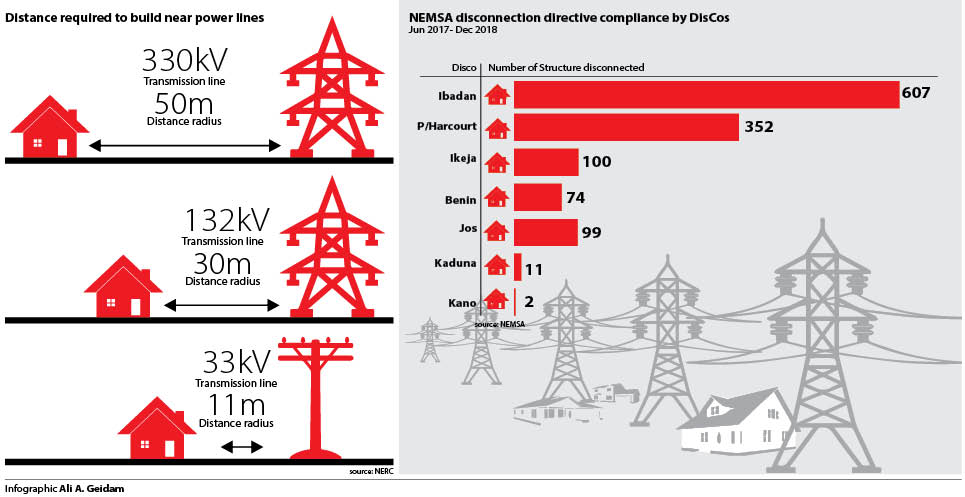In the Federal Capital Territory (FCT), Nasarawa and Niger states, residents are flouting extant safety laws in the power sector as they build structures and conduct businesses under electricity lines’ Right of Way (RoW).
There are others whose wired connections contravene the specified heights and rules, a Daily Trust inquest shows.
A law is being flouted
The Nigerian Electricity Regulatory Commission (NERC) safety regulation titled: “Nigerian Electricity Supply and Installation Standards Regulations 2015”, stipulates that for a 330kV transmission line, a 50- metre distance split equally must be maintained on both sides of the lines before erecting structures. For a 132kV transmission line, the distance is 30 metres. For the power distribution side, 33kV and 11kV lines must have on both sides distance of 11 metres.
“For safety reasons, no structure shall be built under the overhead line’s Right of Way (RoW). Where such structures are built after the construction of the lines, the licensee shall not be liable for any mishap caused by contact with the lines,” the law further states.
It also mandates the Distribution Companies (DisCos) to comply with certain sections. For instance, where overhead lines with bare conductors are routed across sites used for public recreation and work activities other than farming, they shall be protected with cradle guards or nets.
Dawaki, Dutse residents dare high tension
At Dutse Zone 7, a subsurb that is some 20 minutes’ drive from Abuja’s city centre, some residents and buildings are under a 132kV transmission line. Some of the residents gave reasons for their action.
Abdulazeez Olabayo, a house owner in the area, said: “I bought this land genuinely from the indigenes and built on it. When NEPA (now AEDC) connected it, they said it was not dangerous even though it is close to a high tension tower. They are the experts.”
Asked if he is aware of the danger of electrocution, Olabayo said: “It is clear now, they put danger sign on the tower. We don’t allow children near it.”
Mariam Audu sells roasted yam under the 132kV line but is unaware that the line could snap and pose a risk to her.
She said, “I don’t think it can snap because they said the white men built this line. But we don’t stay here all day, I come out from 10:00am and leave by 05:00pm.”
At another section called Dutse Alhaji Zone 4, many houses are built into the 50-metre distance of the 330kV transmission Right of Way (RoW). There is a provision store leaning by the high tension tower, while dozens of 400V line carrying cables zigzag on lean short poles as they make their way into houses in the slums.
AEDC workers with their ladders were Dutse Alhaji to confirm electricity payment under the shabby networks when our reporter visited.
At Awoyinka Crescent, there are infractions as people ignorantly run their businesses under the 132kV power line. At Dutse Sokale in Bwari Area Council, welders and other businesses are operating within the RoW and some directly under the power lines.
Daily Trust observed that AEDC complied with the regulation as it provided a cradle net for a major 33kV line crossing a street at Dutse Sokale and directly under a 132kV transmission line. However, that is only one among the many 11kV lines that crisscross many streets across Dutse, Suleja in Niger State, Mararaba in Nasarawa State and other places where our reporter visited.
Block industries are on the rise under power lines in Dutse and Dawaki areas of the FCT. Right under a combination of 132kV and 330kV transmission lines, our reporter counted seven block industries with people working, trucks delivering sand and the moulders setting blocks.
Abubakar Ismail works in one of the block industries around City Polytechnic, Dawaki. He said: “This is an open space, apart from the tax we pay to revenue collectors from the Abuja Environmental Protection Board (AEPB), we don’t pay for ground rent, so it is cheaper,” he said in Hausa Language.
Still in Dawaki where the Transmission Company of Nigeria (TCN) recently broke ground for the construction of a 132kV substation, a number of small businesses are operating. A block industry owner who chose not to be named said, “This is an expanse open space. We have to use it here. We are not living under it. When we mould the blocks, we don’t stay there, so I think we have nothing to fear.”
Katampe, Kuje, others take turns
There are such breaches in parts of Katampe, Kuje, Lugbe, Jikwoyi, Karshi, Waru and Kabusa areas of the FCT where this investigation covered. At Katampe near Abuja city, a section of the equipment yard of a construction firm is directly under a 132kV transmission line with no insulation or cradle net as stipulated by the NERC 2015 Regulation.
Within the RoW, a car sales stand operates at Katampe. That also is an infraction in line with the extant safety laws in the Nigerian Electricity Supply Industry (NESI).
At the entrance to Kuje Town, there is an open market of fruit sellers, phone accessories and other items directly under a cluster of 33kV distribution power lines. Arrays of low hanging wires were noticed around the market area.
Mrs. Ijeoma Onyeka sells provisions at the Kuje junction and feels safe because she said she knew when the 33kV lines were constructed.
“The work was done about five years ago. It is not old and I don’t think it poses any risk to us, but we are careful too,” she said.
Niger, Nasarawa communities in same act
At the Kaduna Road area of Suleja in Niger State, houses are scattered across the rocky terrain with some near the 330/132kV transmission lines. Farming activities are also being conducted across these places where the high tensions pass through.
However, the most worrisome of these cases are the siting of unfenced transformers across many communities surveyed.
Amos Chijoke, a resident of Madalla in Niger State, raised concern over how a transformer near his house sparks at night and the splinters fly towards people because it is unfenced.
In Nasarawa State, there are many houses and businesses sited under 33/11kV lines and 400V lines that are loosely strung to rickety poles. Many structures along the Abuja to Keffi expressway were marked since 2017 by the Federal Ministry of Power, Works and Housing for removal. It was also learnt that the marking was also for the purpose of highway expansion works which the Minister, Mr. Babtunde Fashola, flagged off in 2018.
Daily Trust observed that the work has begun from the Kugbo axis of Abuja and would take off those marked structures up to Lafia, the capital of Nasarawa State.
453 persons electrocuted in 3yrs
While people continue their activities under power lines, there are recorded figures of lives that this practice has claimed through electrical accidents. A report on electrical accidents obtained from the Nigerian Electricity Management Services Agency (NEMSA) shows that 453 persons were electrocuted between 2015 and October 2018.
A breakdown shows that 113 deaths occurred in 110 accidents in 2015; another 140 persons died when they were involved in 124 accidents in 2016. In 2017, 95 accidents caused the electrocution of 113 persons; from January to October 2018, NEMSA reported 87 deaths recorded in 82 accidents.
Disconnect faulty structures – NEMSA
The Managing Director of NEMSA, Engr. Peter Ewesor, told this paper that the agency was working to ensure operators in the power sector attained “zero target” for accidents and electrocutions. NEMSA traced cause of electrical accidents to unsafe use of power by the public (55 per cent) while others include encroaching on RoW, poor adherence to safety rules by the operators and the ageing networks.
In 2017, NEMSA issued a directive to the 11 DisCos to disconnect buildings that are under the Right of Way (RoW) of power lines.
A record from NEMSA shows that between June 2017 and December 2018, about 1,205 buildings found to be close to power lines were disconnected nationwide. Ibadan DisCo disconnected 607 structures, Port Harcourt DisCo disconnected 352. Ikeja and Benin DisCos disconnected 100 houses and 74 premises respectively.
Under Jos DisCo, 99 houses were disconnected, Kaduna DisCo disconnected 11 buildings, and Kano DisCo disconnected two. There are no records for Abuja, Eko, Enugu, and Yola DisCos disconnecting defaulting structures.
We enlighten customers, rehabilitate network – AEDC
The Abuja Electricity Distribution Company (AEDC) was contacted on the breaches across their franchise area comprising Kogi, Abuja, Nasarawa and Niger states. The General Manager, Corporate Communication, Mr. Oyebode Babs Fadipe, said the issue of trading under power lines was a multi-sectorial one.
He said, “We have worked with government agencies like NEMSA and the Federal Capital Development Authority (FCDA) to rehabilitate the network and make them safe.”
Fadipe gave instance of Gishiri community in Abuja where the DisCo “killed down the network and rebuilt it. We also installed new meters there.”
He also said there was an aggressive enlightenment of customers and all those trading under electricity lines.
“We go to market places and schools to educate customers. The power to bar people from trading under electricity lines resides in the law enforcement agents and other relevant bodies,” Fadipe concluded.
Supported by Daily Trust Foundation and MacArthur Foundation.

 Join Daily Trust WhatsApp Community For Quick Access To News and Happenings Around You.
Join Daily Trust WhatsApp Community For Quick Access To News and Happenings Around You.


